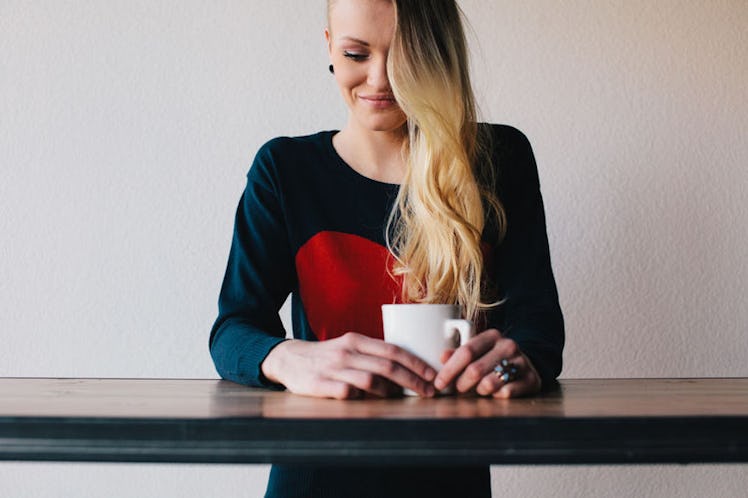
You Probably Had No Idea That Coffee Does These 4 Weird Things To Your Body
One day when I was in high school, I was in line at a coffee shop to grab my favorite iced coffee when a strange man told me, "Better be careful. That'll put hair on your chest." You've probably heard this idea before, but besides the fact that this theory was both creepy and unsolicited, it's scientifically false. Still, it made me second-guess my frapp order or mug of regular drip coffee for a while, because I genuinely had no idea how drinking caffeine was affecting my body. I'll admit, coffee does do some weird things to your body, but I feel pretty confident saying it won't put hair on your chest.
From improved vision to a high pain tolerance, coffee has so many health benefits that it should basically be classified as a superfood, in my opinion. But don't get discouraged if you don't notice some of these things after your morning cup. According to Grace Derocha, a registered dietitian, certified diabetes educator, and certified health coach at Blue Cross Blue Shield of Michigan, the effects of caffeine can vary a fair amount depending on different factors, like how dehydrated you are, how much or little you've exercised, the last time you ate, and even the amount of sleep you get.
Regardless, in honor of National Coffee Day, drink up and read about some of the cool, and sometimes weird AF things coffee can do to your body.
It doesn't give you energy, but it blocks drowsiness
It might seem like basic information that coffee makes you feel less tired. But the actual science behind it probably isn't what you think, says Matteo Franceschetti, co-founder and CEO of sleep tech company Eight. "Caffeine doesn’t actually make you feel energized," he tells Elite Daily over email. "Instead, it blocks adenosine, a chemical that signals sleepiness, from attaching to receptors in the brain. As a result, you mistake the mask of tiredness as the feeling of being energized."
How much coffee you drink can determine how much you sleep
In a survey conducted by Franceschetti's company Eight, he tells me that when customers were asked about their sleep schedules and caffeine intake, including how much and when they drank the stuff, the results showed, from over 3,500 nights of sleep data, that there's a clear link between the amount of coffee you drink during the day and the amount of sleep you get at night.
"If you drink one to two servings," Franceschetti tells Elite Daily, "you sleep on average six hours and 45 minutes, whereas, if you drink four to six servings, your sleep will look more like six hours and 22 minutes."
This might not seem like much lost sleep initially, but the next time your alarm goes off in the morning, consider whether you'd like to be able to snooze for 23 more minutes, and I'm willing to bet the answer would be yes.
Your morning cup may make you less sensitive to pain
In a recent study published in the journal Psychopharmacology, 62 adults were asked to track their caffeine intake for seven consecutive days. They were then tested to see how varying levels of pressure and pain affected them (in a controlled, laboratory setting), and whether the caffeine made any difference. The researchers discovered that consuming more caffeine on a regular basis makes you less sensitive to physical pain.
Sounds like someone needs to write a Coffeewoman superhero comic, if you ask me.
Your frappuccino might give you eagle eyes
Do you want excellent vision without having to snack on carrots all day long? Your coffee habit may be just the thing for keeping your eyes healthy. “Research suggests that if you drink coffee, your pupils may dilate very slightly,” Marc Leavey, M.D., a primary care specialist at Mercy Medical Center in Baltimore, told Yahoo Lifestyle. “It’s so subtle that you wouldn’t be able to notice it just by looking in the mirror, but you may feel that you can see better.”
No matter how large or small the effects of this may be, I for one am thrilled to be able to watch my adorable cat snooze from across the room, with 20/20 vision to boot.